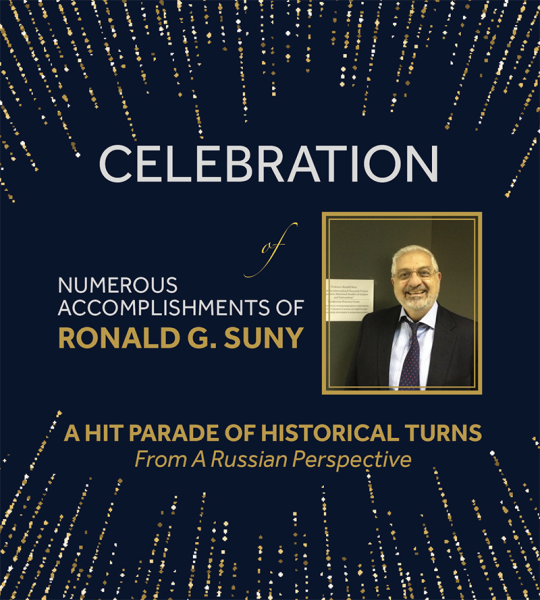Center for Armenian Studies Events
For previous years' guest speakers and topics, please visit the Center for Armenian Studies poster and flyer archive.
We also encourage you to check out a selection of CAS video recordings on our Videos of Past Events page and on our YouTube channel.
Please find the complete conference program here:
https://myumi.ch/kyPn9
IN-PERSON AND VIRTUAL EVENT
Room 1010, Weiser Hall
500 Church Street
Ann Arbor, MI 48109
Participate virtually by registering in advance for the webinar: https://myumi.ch/RWmn5
Over the last fifty years, the historical profession has undergone a profound transformation. Animated by political changes and new theories from outside the discipline, historians have repeatedly broadened the scope of their inquiries and “turned” to culture, language, emotions, and other novel categories for understanding the past. The field of Russian/Soviet history, born in the polarized era of the Cold War, has adapted and responded to each of these successive turns.
This one-day conference offers an overview of the development of the Russian/Soviet history field through critical engagement with some of the most original and methodologically exciting turning points. Each panel centers on a different thematic area or methodological approach, with a key text suggested for discussion. The conference schedule roughly follows the chronological trajectory of Ronald G. Suny’s oeuvre: from his earliest studies on the social history of the October Revolution, through his engagement with the cultural turn of the 1980s-90s and focus on non-Russian nationalities within the USSR, and finally to more recent work on empire and affect. Panelists will provide an assessment of Suny’s contributions in these areas, as well as personal reflections on how these historiographic turns have influenced their own lives and intellectual projects.
If there is anything we can do to make this event accessible to you, please contact us at caswebinars@umich.edu. Please be aware that advance notice is necessary as some accommodations may require more time for the university to arrange.
IN-PERSON AND VIRTUAL EVENT
Room 1010, Weiser Hall
500 Church Street
Ann Arbor, MI 48109
Participate virtually by registering in advance for the webinar: https://myumi.ch/RWmn5
Over the last fifty years, the historical profession has undergone a profound transformation. Animated by political changes and new theories from outside the discipline, historians have repeatedly broadened the scope of their inquiries and “turned” to culture, language, emotions, and other novel categories for understanding the past. The field of Russian/Soviet history, born in the polarized era of the Cold War, has adapted and responded to each of these successive turns.
This one-day conference offers an overview of the development of the Russian/Soviet history field through critical engagement with some of the most original and methodologically exciting turning points. Each panel centers on a different thematic area or methodological approach, with a key text suggested for discussion. The conference schedule roughly follows the chronological trajectory of Ronald G. Suny’s oeuvre: from his earliest studies on the social history of the October Revolution, through his engagement with the cultural turn of the 1980s-90s and focus on non-Russian nationalities within the USSR, and finally to more recent work on empire and affect. Panelists will provide an assessment of Suny’s contributions in these areas, as well as personal reflections on how these historiographic turns have influenced their own lives and intellectual projects.
If there is anything we can do to make this event accessible to you, please contact us at caswebinars@umich.edu. Please be aware that advance notice is necessary as some accommodations may require more time for the university to arrange.
| Building: | Weiser Hall |
|---|---|
| Event Type: | Conference / Symposium |
| Tags: | Armenia |
| Source: | Happening @ Michigan from Center for Armenian Studies, The College of Literature, Science, and the Arts, International Institute, Eisenberg Institute for Historical Studies, Center for Russian, East European, and Eurasian Studies, Weiser Center for Europe and Eurasia, U-M Office of Research, Department of History, Department of Political Science, Slavic Languages & Literatures |


